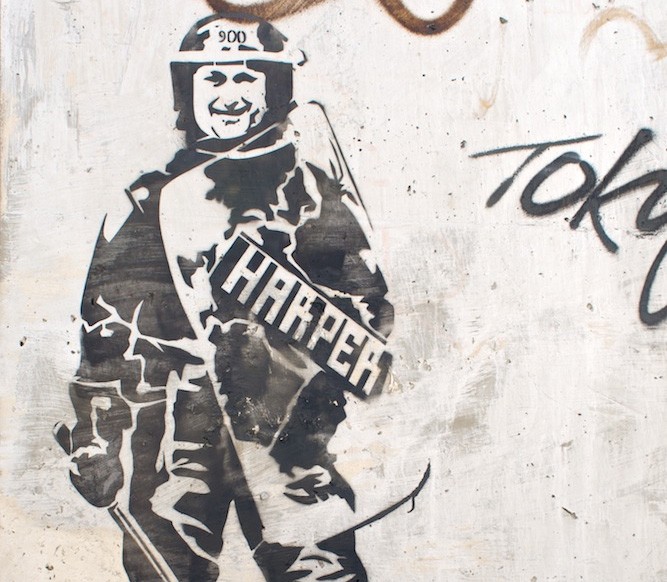
G20 Graffiti depicts Harper in riot gear.
Photo by designwalla.
The anarcho-libertarian paradox
Our Canadian parliamentary democracy is a slow, crippled, corrupt beast. It's a threadbare patchwork of centuries-old traditions and bureaucratic roadblocks. But, to quote Churchill, "Indeed, it has been said that democracy is the worst form of government except all those other forms that have been tried from time to time." (House of Commons, 11 November 1947)
The content of this post will be a mashup of one of my videoblogs and a letter to the editor I wrote last year. I haven't been writing much in the past few weeks, since I was on vacation and then moving into my new place in Waterloo. I'm recording some new tunes so I'll have some music stuff to share with you soon!
The anarchist-libertarian political identity is appealing, even fashionable, among youths and young adults because it lets you oppose everything without having to actually come up with a better alternative.
Max Weber, the German economist and sociologist, first coined the term "monopoly on violence" to define a state's raison d'être. Though Weber intended this statement as purely an observation, anarcho-libertarians have used this concept to argue that there is a universal systematic oppression by governments upon their own citizens and foreign countries through the military and police force. Though it may be true is some cases, the simple existence of government doesn't mean that it will use force to oppress its people.
Anarchy in a nutshell is this: whatever the government does, private citizens can do better. I don't agree, because in my mind, such a system would implode fantastically. The privatization of public services necessitates a profit motive. This profit motive could be currency, but my illustration works under a barter system too. So when you combine a profit motive with zero regulation, there's no way ordinary people can get transparent information.
Let's take health care as an example. If you go to your family doctor, or the emergency room, you can be fairly confident that the clinic or hospital has passed a set of publicly-available health regulations. You can look at your doctor's licence and be satisfied that she went through the appropriate training to be an expert in medicine (the requirements of which are publicly available). You may not agree with the regulations that the government imposes on the medical profession, but at least you can know exactly what they are and vote to change them.
In the anarcho-libertarian system, you have two options: blind trust in your doctor (whose motive is profit and not your well-being), or, if you yourself are a medical expert, you can ably discern where to go for good treatment. Therein lies the problem of anarchy: you must become an expert at everything. All the responsibilities taken on by 308 Members of Parliament working full-time have to be internalised by each and every individual in a purely libertarian economy. Frankly, I don't think that's desirable nor possible. The only logical result is that lots of people will get swindled and taken advantage of by profit-seeking businesses masquerading as social services.
One more anecdote: when Stephen Harper prorogued parliament in 2008 and 2010, there was a cry of jubilation from the libertarian segment of the right wing. Obviously, less government seemed to be a good thing. But the irony is, there wasn't actually less government during the prorogations. Parliament was prorogued, not Harper's government staff. What this means is the Conservative party was able to work unfettered by such trivialities as defending their decisions in question period or seeking approval from the opposition parties. Far from diminishing government, prorogation allowed the work of government to steamroll ahead without any checks and balances.
As fashionable as it is to rebel against "the man", I seriously doubt Canada needs a revolution. What we do need is an evolution of our democracy, changes to our constitution, and a truly representative parliament.
Frankly, what we need most of all is for young people to actually give a damn and vote. But more on that in a later post.
Sam Nabi